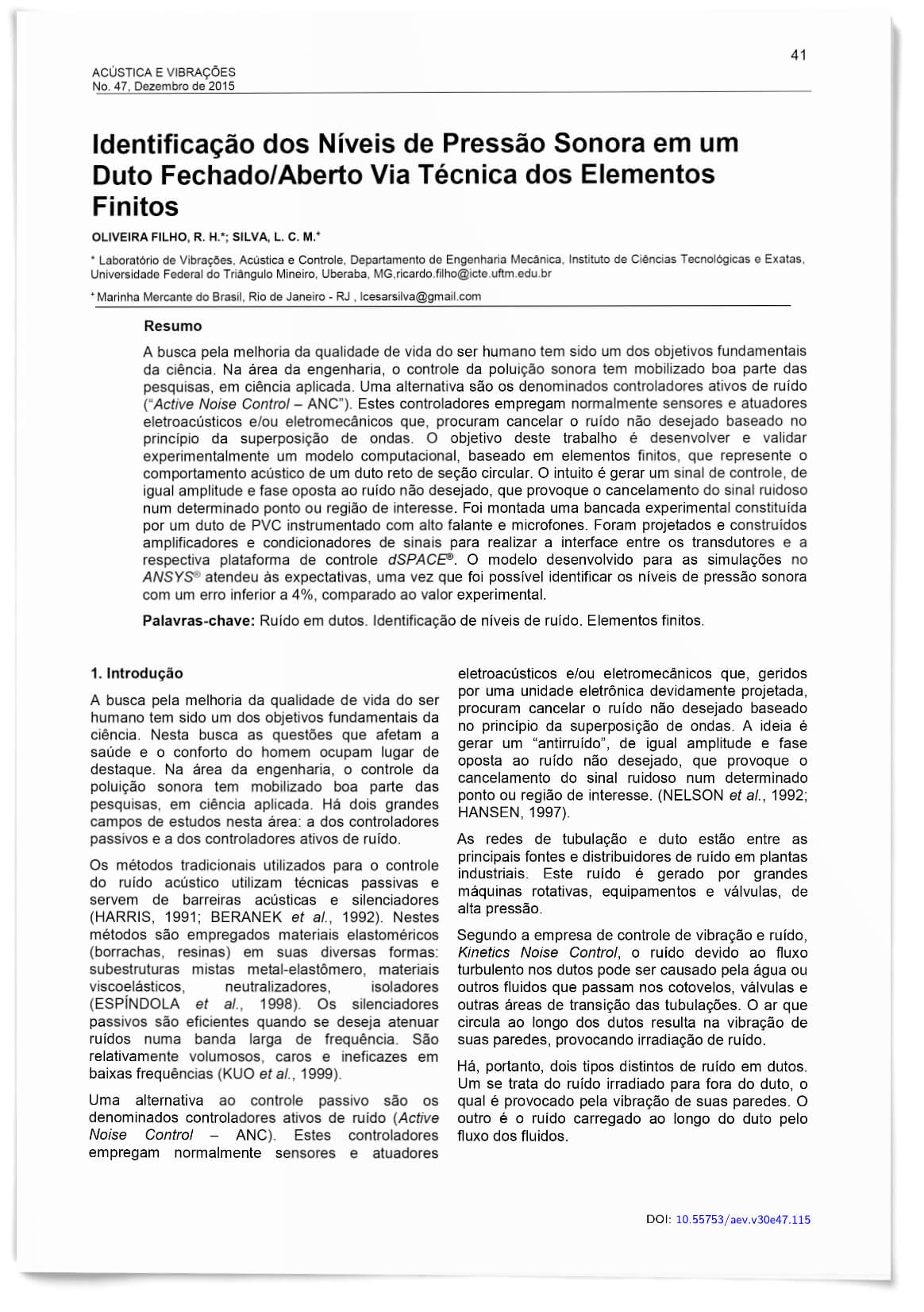Identification of Sound Pressure Levels in a Closed/Open Duct Via Finite Element Technique
DOI:
https://doi.org/10.55753/aev.v30e47.115Keywords:
pipeline noise, identification of noise levels, finite elementsAbstract
The search for the improvement of the quality of life of the human being has been one of the fundamental objectives of science. In the area of engineering, the control of noise pollution has mobilized much of the research in applied science. An alternative is the so-called Active Noise Control (ANC). These controllers normally employ electroacoustic and/or electromechanical sensors and actuators that seek to cancel unwanted noise based on the principle of superposition of waves. The objective of this work is to develop and experimentally validate a computational model, based on finite elements, that represents the acoustic behavior of a straight duct with a circular section. The aim is to generate a control signal, of equal amplitude and opposite phase to the unwanted noise, which causes the cancellation of the noisy signal at a given point or region of interest. An experimental bench consisting of an instrumented PVC duct with loudspeaker and microphones was set up. Amplifiers and signal conditioners were designed and built to interface between the transducers and the respective dSPACE® control platform. The model developed for the ANSYS® simulations met expectations, since it was possible to identify sound pressure levels with an error of less than 4%, compared to the experimental value.
References
BERANEK L. L. and VER I. L., Noise and Vibration Control Engineering: Principles and Applications, New York: Wiley, 1992.
ESPÍNDOLA, J.J. e LOPES, E.M.O., Caracterização de Materiais Elastoméricos para o Controle de Vibrações e Ruídos Acústicos, II Simpósio Brasileiro Sobre Sistemas Dinâmicos da Mecânica – DINAME - Campos do Jordão – SP, 1998.
GERGES, S. N. Y., 2000, Ruído, Fundamentos e Controle. Florianópolis – SC.
HANSEN C. H. and SNYDER S. D., Active Control of Noise and Vibration, London, U.K.: E&FN Spon, 1997. HARRIS C. M., Handbook of Acoustical Measurements and Noise Control, 3rd ed. New York: McGraw-Hill, 1991.
KUO S. M. and MORGAN D.R., Active Noise Control: A Tutorial Review, in Proc. IEEE Int. Symp. Circuits Syst., pp. 943–973, 1999. doi: 10.1109/5.763310 DOI: https://doi.org/10.1109/5.763310
NELSON, P. A. e ELLIOTT, S. J., Active Control of Sound, San Diego, CA: Academic, 1992.
NUÑEZ, I. J. C., 2005, O controle ativo de ruído em dutos: um estudo teórico – experimental. Tese de Doutorado, Universidade Federal de Uberlândia, Uberlândia, MG, Brasil.
KERÄNEN, J.; HONGISTO, V.: Comparison of Simple Room Acoustic Models Used for Industrial Spaces. Acta Acustica united with Acustica,Vol. 96, Number 1, pp. 179-194, January/February 2010. doi: 10.3813/AAA.918267 DOI: https://doi.org/10.3813/AAA.918267
SLAMA, J. G.; KORTCHMAR, L.: Exposição ao Ruído em Ambientes de Trabalho: Panorama Internacional. In: 1o Simpósio Brasileiro de Metrologia em Acústica e Vibrações, XVII Encontro da Sociedade Brasileira de Acústica. Petrópolis RJ. p. 191-194, 1996.
SVENSSON, P.: The Early History of Ray Tracing in Room Acoustics. Edited by Peter Svensson Trondheim, June 2008. doi: 10.1007/978-3-319-05660-9_2 DOI: https://doi.org/10.1007/978-3-319-05660-9_2
KROEFF, G.; PAVANELLO, L.; MEDEIROS, E. B.: Preliminary Modeling Of Acoustic Emission In An Urban Substation. In: Congresso Ibero-Latino Americano de Métodos Computacionais para Engenharia. Brasília, 1997.
NUNES, M. A. A.; Duarte, M. A. V.: Identification of Noise Sources Using Genetic Algorithm. In: Internoise 2005, Rio de Janeiro, 2005.

Published
How to Cite
Issue
Section
License
Copyright (c) 2015 Acústica e Vibrações

This work is licensed under a Creative Commons Attribution-NonCommercial-ShareAlike 4.0 International License.




